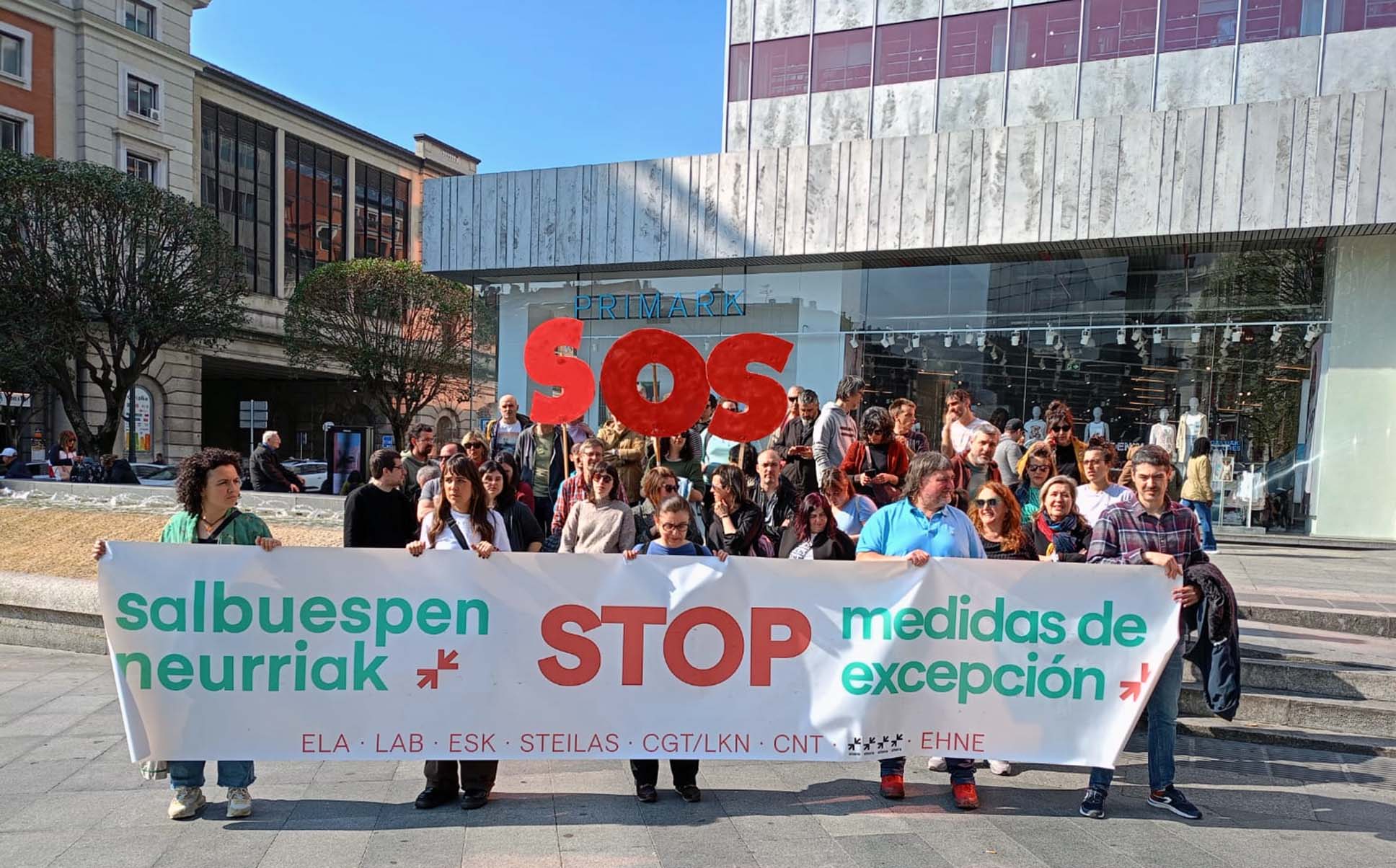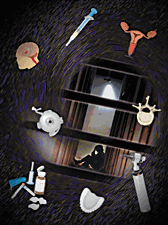They call for the freedom of sick prisoners over prohibitions and attempts at criminalization in Vitoria-Gasteiz
- Abetxuko's essay José Ramón López de Abetxuko and lawyer Txeman killings have offered a talk about the situation of sick prisoners on the university campus of Vitoria-Gasteiz. The room is overflowing. In the past, the right-wing unionist association Esteban de Garibay has concentrated against the Pozueta conference. The presence of the media and the police has been appalling.

The Prosecutor’s Office of the Spanish National Court has dismissed Vox’s request to ban the speech, but has asked the Police to monitor the act. The Spanish Government delegate to the CAV, Jesús Loza, had already asked Sare to cancel his speech because, although it was legal, it would mean "an attack and a humiliation of the victims". Covite addressed the UPV/EHU to ban the conference. The PNV, for its part, acknowledged that the act was legal, but questioned whether it could be "humiliating for the victims of terrorism", according to Erkoreka.
SARE has kept the call and held an emergency press conference at the door of the building, where it was planned to take the floor. The citizens' initiative has defended the importance of "empathy and understanding" and stressed that the attempt to boycott "undermines coexistence". The spokesman for the Basque Government, Iñaxio Oiartzabal, stressed that López de Abetxuko "has his conviction fulfilled" and is fully aware of his rights. The UPV/EHU has issued a communiqué stating that the room’s request is correct and that authorisation does not mean that it is in line with the content. However, he has asked Sare “to take into account the feelings of ETA victims, to act sensibly and to avoid gestures or expressions that may offend victims”.
Outdoor, media show
At noon, the Esteban Garibay Association, headed by Carlos Urquijo, concentrated in front of the building, where the conference was planned, around a banner reading: I don't forget or pardon. The members of the pp have been the most prominent in the vote. The event was attended by Alfonso Alonso, Iñaki Oyarzabal and Ramón Rabanera, among others. Dozens of journalists and media from across the state have also participated, some of them with live broadcasts throughout the day. A dozen Ertzainas dressed in uniform have come to the entrance of the building, which has been closed down. Also some of the top officials of the Ertzaintza street dresses, watching what was happening both outdoors and in the conference room.

Inside, the pedagogical request to free sick prisoners
The talk started half an hour late, as reported by the Basque Department of Education. The UPV/EHU has prevented access to the media due to problems of capacity. However, some of the journalists have entered the room and witnessed the aggression. Members of the network have tried to monitor the entrance of the room by serving boycotts, police and the media. The room has been small because of the imminence of the area ' s neighbours. The 70 seats were occupied, and another 50 people, at least, have continued their speech sitting on the floor or standing. There have been many young people among listeners, but citizens of all ages have approached each other.
López de Abetxuko and Matanzas have offered an explanatory and pedagogical talk. López de Abetxuko has been the first to speak. He has started his speech by saying that he wants to make a contribution, “telling what it is to be in prison when he is ill”. He has spent almost 30 years in jail, where he was seriously ill with his heart for many years. He was operated in prison to beat his heart. Firstly, he referred to the living conditions of Basque political prisoners, with particular emphasis on isolation. Inmates have two or four hours of yard and the rest of the time they spend alone in the cell. López de Abetxuko has stated that isolation leaves a “mark” over time and that, in these living conditions, the preservation of a “waterfall” also becomes a “crossing point” due to bureaucracy and annoyance.
According to López de Abetxuko, the period between the request for an appointment and the holding of the appointment can be extended by one month in prison. For this reason, “many stop seeking medical care.” This facilitates the worsening of diseases. Regarding the diagnosis of a serious illness, he explained that the prisoner has two fundamental feelings: “Anguish and fear.” Anguish, because friends and family will suffer without being able to do anything. Fear, because the ghost of death is always present. He has set his case as an example. Lopez de Abetxuko suffers from heart disease. In isolation, a tachycardia attack and an alarm would have elapsed 45 minutes before being treated. “By then he was already dead.”
López de Abetxuko referred to the "new political times". In this regard, he has denounced that "it is not acceptable" for the dispersion and sick prisoners and prisoners over 70 years of age to remain in prison. He recalled that law enforcement is being demanded and that there is no privilege in it. He concluded his speech by saying that sick prisoners are "being sentenced to death".
Health, an indispensable front
Lawyer Txema Matanzas has portrayed listeners the image of sick prisoners in prison. Massacres began in 1989, “the health of prisoners was not our priority then”. Among other things, because prisoners in general were younger. The average age of the collective has increased considerably since then. This, together with the poor living conditions of the penitentiary center, has led to the appearance of new diseases: psychological, cognitive and physical. Consequently, “health has become an indispensable fighting front”.
The official list of severely ill prisoners today includes 21 people. Among the detainees was the Alavés José Ángel Otxoa de Eribe, who has been arrested. He died in October, despite being a serious illness, and only four months before his dismissal had been approved. However, he warned that “it’s a dynamic list.” The list will be renewed at the beginning of the year and anticipates that the number of names will increase.
Massacres have drawn the crude situation. “We can’t get sick prisoners out. There are no legal or political conditions.” While these conditions are being created, the lawyer has focused the fight on three things: granting conditional freedoms; ending the dispersion and returning the prisoners to Euskal Herria; and transferring the sick to prisons where medical care is the most appropriate.
The speech has ended with applause and an appeal to the fight for the prisoners, who have qualified as "unjust". Outside the building, police and dozens of cameras and journalists awaited Abetxuko’s arrival in a threatening surveillance state. Outside the room there was also a small group. After a wait of about ten minutes, the speakers have come out of another door and no one has noticed the presence of the members of the Network, as well as the attendees. It is a brand, as Matanzas pointed out to ARGIA, as this talk would not cause any scandal either twenty years or ten years earlier.
Euskal preso politikoa ostiralean hil zen minbizi baten ondorioz, 30 urteko espetxealdiaren ostean kaleratu eta 10 hilabetera. Troitiñoren kasua euskal presoei aplikatzen zaien salbuespen politikaren adierazle dela salatu dute bi elkarteek. Mobilizazioak antolatu dituzte... [+]





















